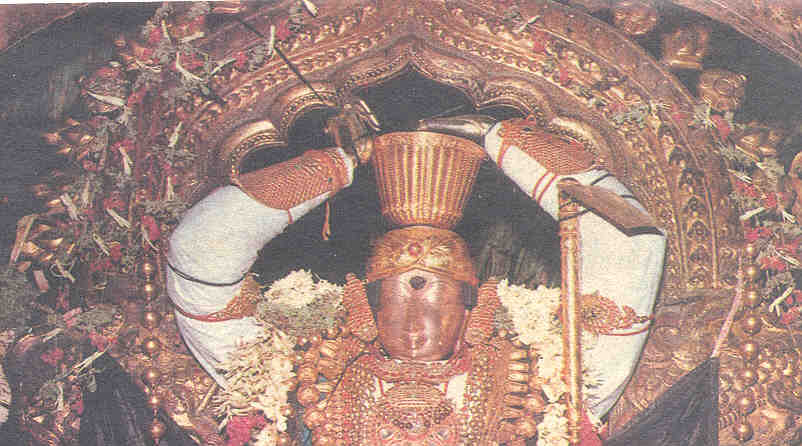
Two of the miracles associated with the life of the
Saint Poet Maanikkavaacakar are narrated in the work Tiruvilaiyaadal Puraanam.
The Pandya Chief Minister, Tiruvaadavuraar
was directed by the king to proceed to the east coast and procure quality horses that were
being traded there. The minister proceeded with a vast sum of money, and on his way, as he
approached Tirupperunturai, he heard the sound of Vedic hymns, and saw a
group of saints seated around their Guru, in a grove.
Perceiving this teacher to be none other than Shiva, he lost sense of his
ministerial role and surrendered himself to the Guru, breaking
spontaneously into chaste Tamil verse. The Guru immediately addressed the
minister as 'Maanikkavaacakar' - (one whose words are rubies). Maanikkavaacakar
adopted the life of a mendicant, and spent all his wealth renovating the temple at Tirupperunturai
dedicated to Shiva.
A distraught king, upon seeing no sign of the promised horses, or his esteemed chief
minister sent out emissaries in search, and was enraged to hear of what had happened.
Maanikkavaacakar's Guru however, presented his disciple with a priceless ruby and
instructed him to let the king know that the horses would arrive on the day of Aavani
Moolam.
Maanikkavaacakar returned to Madurai
on in the Tamil month of Aavani, on the Moolam asterism
with a herd of fine horses miraculously; a delighted king welcomed him back with great
splendour. However, the horses transformed themselves into jackals that they originally
were, and their howls rent the night air of Madurai. A furious ruler,
smelling foul play admonished Maanikkavaacakar and condemned him to a
life of torture.
Armed guards led the minister to the scorching sands of the Vaigai and
commenced their torture, and lo, the waters of the Vaigai river swelled
in floods, thereby dampening their operations. The ruler, determined to protect his
kingdom from the onslaught of the swirling floods, ordered each and every citizen of the
kingdom to rush to the river bank to build a mammoth embankment that would protect his
kingdom.
A wizened old lady was ordered by the king's guards to carry baskets of earth for building
the embankment. Feebled by age, the lady unable to carry out the command, offered to trade
a handful of 'pittu' that she had cooked, in exchange for the laborious
work. Passersby scorned the old lady for this apparently trivial barter offer.
Shiva appeared in front of the lady in the form of a young lad, and
offered to work for her. Upon eating the fistful of pittu offered by her, he began to make
merry on the river bank, while the others continued the laborious task of building the
embankment. The Pandya ruler, who strolled by inspecting the work, found
the lad engaged in flippant conversation, and struck him on his back with a cane. A
miracle occured. The blow that landed on the back of the lad's back landed on every single
person's back, including the ruler's.
The ruler at once realized that the lad was none other than Shiva; he
then realized the greatness of his chief minister, whose acts had led to the course of
events on the river bank. Floods on the Vaigai miraculously ceased, and
the boy disappeared. The Pandya ruler spent the rest of his life as a devotee of Shiva.